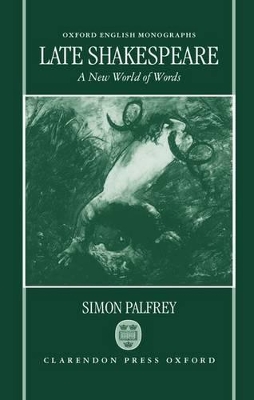Oxford English Monographs
1 total work
Shakespeare's late plays are usually seen in terms of courtliness and escapism. But the critical tradition has been too decorous. Neither neo-Christian pieties nor high-political allegory can account for the works' audacity and surprise, or the popular investment in both their form and meaning. Post-structuralist and historicist approaches show the indeterminacy and materiality of language, but rarely identify how particular figures (words and characters) capture and energise contested history. Recent criticism tends to put a pre-emptive `master-paradigm' above all else; a more sinuous, minutely attentive critical vocabulary is needed to apprehend Shakespeare's turbulent, precise, teeming metaphorical discourse.
Late Shakespeare: A New World of Words reappraises the origins of authority, language, and decorum, and the prospects for each. Through his portrayal of `popular' desire---in his rustics, clowns, rogues, slaves, women---Shakespeare presents worlds which explore the meaning of the `subject', and the potential for effective transformatory agency. Rather than a Jonsonian (or perhaps earlier Shakespearian) verisimilitude, with each person discrete and verifiable, Shakespeare's characters embody metaphor-in-process; like the revamped romance genre itself, they `take on' surrounding turbulence.
The plays show the stormy consequences of hegemonic violence. The subsequent exile to wilderness allows for contingent novelty: new liberties are tested amid the wreckage or recapitulation of old forms. The plays pit possible sources of regeneration (romantic pastoral, semi-populist humanism) against more primal violence and rebelliousness. Finally, the book argues against a conventional sense of the plays' movement towards divinely sanctioned closure; mischief, irony, polysemy remain; romance's political problems are competitive, multiple, and tumescently unpredictable.
Late Shakespeare: A New World of Words reappraises the origins of authority, language, and decorum, and the prospects for each. Through his portrayal of `popular' desire---in his rustics, clowns, rogues, slaves, women---Shakespeare presents worlds which explore the meaning of the `subject', and the potential for effective transformatory agency. Rather than a Jonsonian (or perhaps earlier Shakespearian) verisimilitude, with each person discrete and verifiable, Shakespeare's characters embody metaphor-in-process; like the revamped romance genre itself, they `take on' surrounding turbulence.
The plays show the stormy consequences of hegemonic violence. The subsequent exile to wilderness allows for contingent novelty: new liberties are tested amid the wreckage or recapitulation of old forms. The plays pit possible sources of regeneration (romantic pastoral, semi-populist humanism) against more primal violence and rebelliousness. Finally, the book argues against a conventional sense of the plays' movement towards divinely sanctioned closure; mischief, irony, polysemy remain; romance's political problems are competitive, multiple, and tumescently unpredictable.
